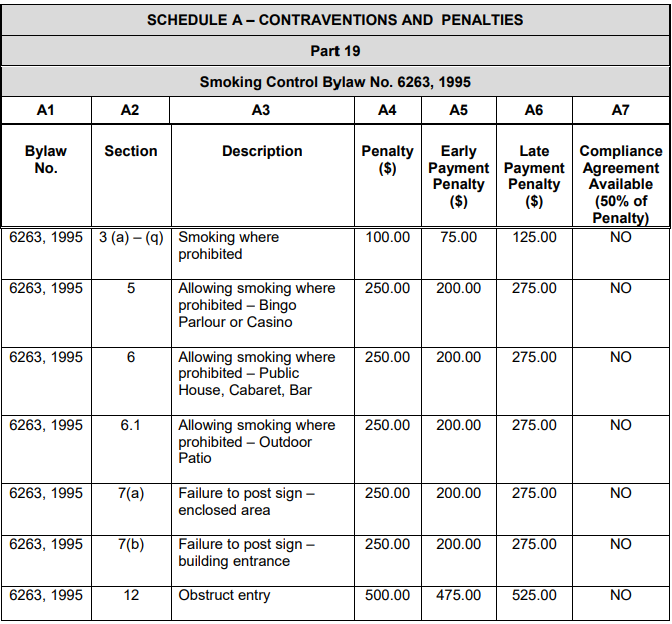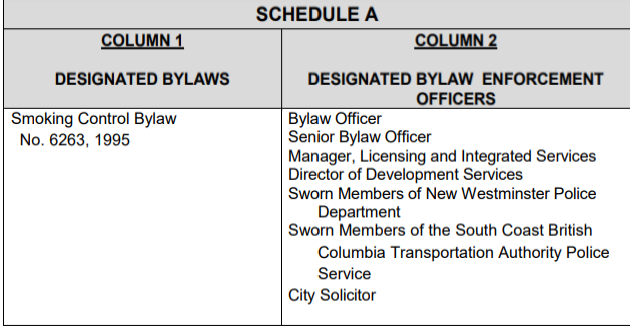ThRe asks—
Hello Pat, Where can I get specific data about fines to smoking bylaw offenders in New Westminster? Thank you
Smoking Bylaws are a bit of a funny beast, because there are more than one enforcement bodies that stick their nose into where you can or cannot smoke. A few years ago, I did a bit of a dive into smoking bylaws around New Westminster Station and some of the “nuisance behaviours” at this primary entrance to the City. I learned that in some areas smoking was prohibited by the TransLink regulations and Transit Police were the enforcing authority, in others the City Bylaws applied, and Bylaw Officers were the relevant authority, and in other areas such as patios and buffer around the doors to restaurants Provincial Health Authority enforcement staff were the relevant agency, but could only apply fines to the proprietors who failed to stop smoking in the public plaza, not to the actual smokers, presumably putting the Mall Cops in charge of any kind of active enforcement. Knowing which side of a metal strip on the ground or how many metres you were from a doorway was important to know who is supposed to enforce the Bylaw in that particular spot. We also apparently cannot enforce smoking bylaws within strata buildings (such as on your residential balcony) as that is something that the provincial Strata Act manages.
Add to this that smoking enforcement is by its nature difficult as it is an ephemeral act, so with overlapping and gap-prone administrative boundaries I would assume actual fines are very, very rare.
The City’s smoking Bylaw is available online: Smoking Control Bylaw 6263, 1995 (last updated in September 2018) lays out the details of what we can enforce in the City. The actual fines for violating the Smoking Control Bylaw are found in the Bylaw Notice Enforcement Bylaw 7318, 2009 (last updated in August 2020), or the Municipal Ticket Information Bylaw 8077, 2019 (last updated in August 2020). And there is a difference.
“Bylaw Notice Enforcement” is a local administrative fine process, run completely by the City. We use this for a bunch of smaller offences (it is limited by Provincial Law to fines under $500) and would be familiar to anyone who has gotten a parking ticket. The adjudication process is run by the City, which is easier and cheaper than relying on provincial Courts. Your ultimate appeal measure would be to come to Council if you disputed it (or the Provincial Ombudsperson, I guess, if things went really bad). Here are the available Smoking fines under that process:
The “Municipal Ticket Information Bylaw” process relies on the Courts, and is more akin to a speeding ticket. You can, if you wish, go to court and appeal to a judge, and they are able to determine an appropriate fine given your situation, up to $1,000. The fun part here is that it turns out pretty much anyone with a badge has the legal authority to enforce it (though City Councillor is suspiciously absent from the list):
So those are the ways Smoking Bylaws may be enforced in the City. If you are more curious about how often or where this enforcement happens, and how many fines are actually collected, You are asking the wrong guy. I would first suggest you contact the City’s Bylaws Enforcement division and ask if they collect this data, and if they are free to share it.
The City is subject to the Freedom of Information and Protection of Privacy Act (FOIPPA), which is a funny two-part set of provincial regulations, one part giveth, one part taketh away. A good way to think of it is that the City must share public information under FOI unless they are strictly forbidden from sharing it under PPA. In practice, the City has to determine if there is Privacy Protection component to any information it shares, which means staff need to comb through it and skim the privacy protection parts off. It is probably important to note that Council is completely separated from this process – except we are sometimes requested to provide information such as our correspondence. The City has professional staff who are well versed in FOIPPA who do those reviews, and under the act, the City is permitted to bill anyone asking for that information to cover the cost of that staff member’s time. It’s not a perfect system, but it is the system we have.